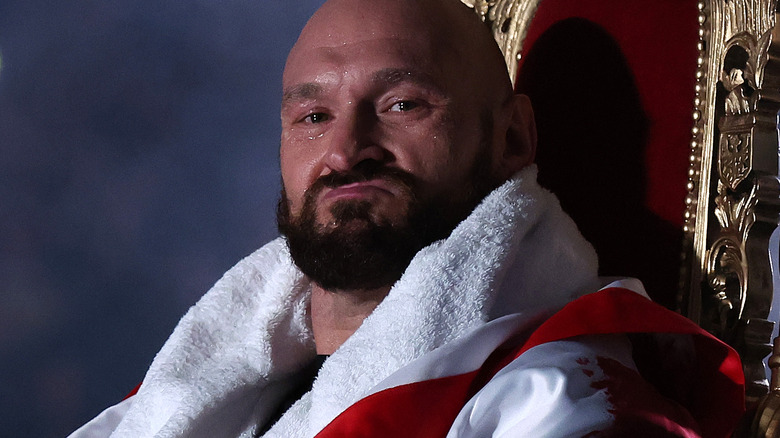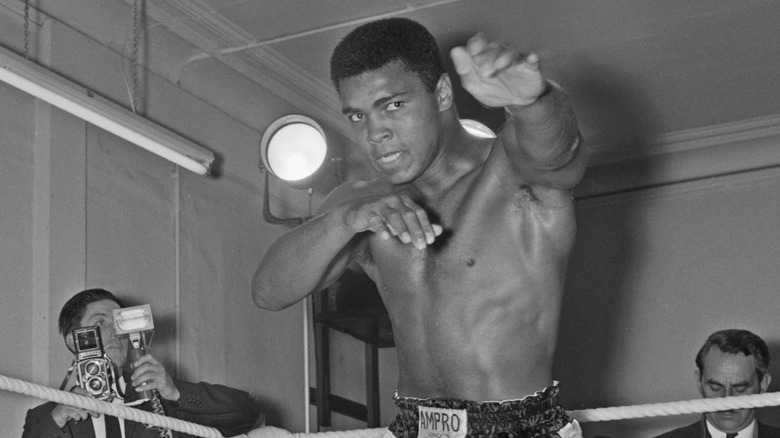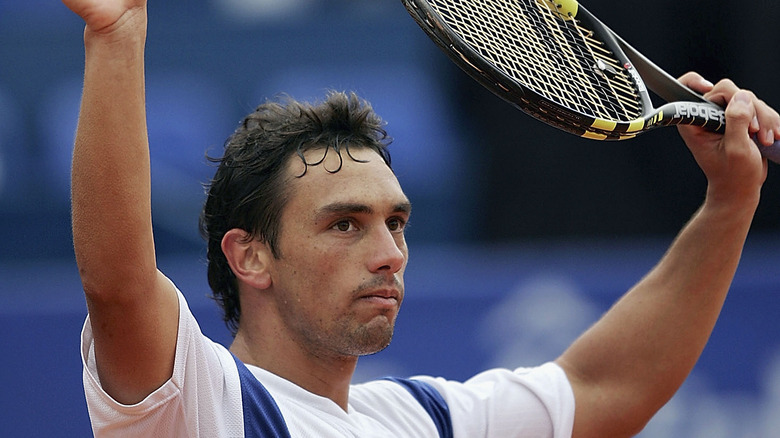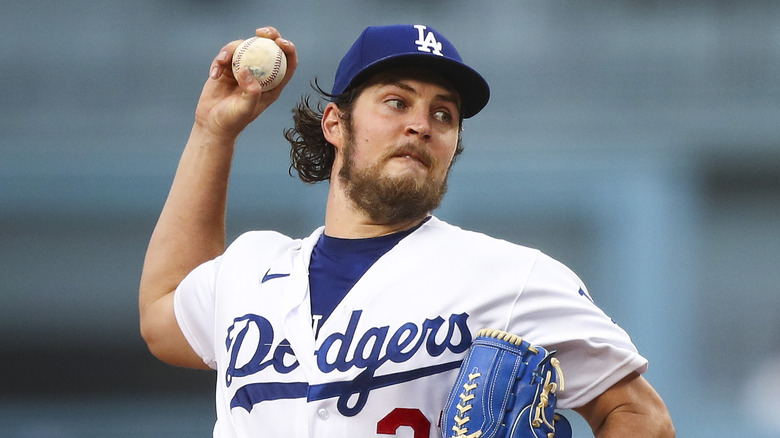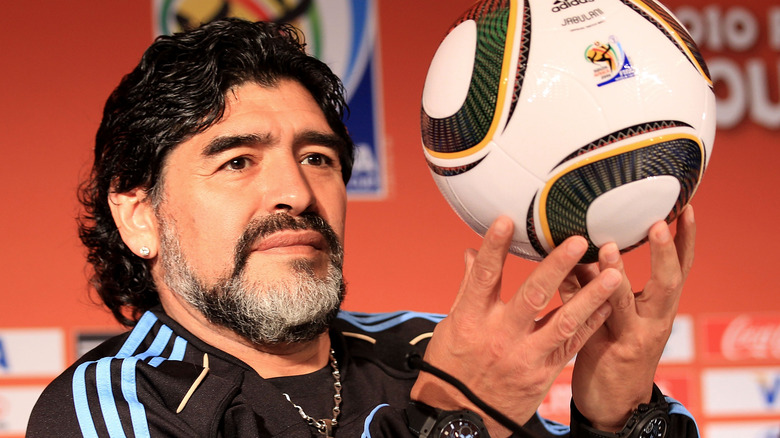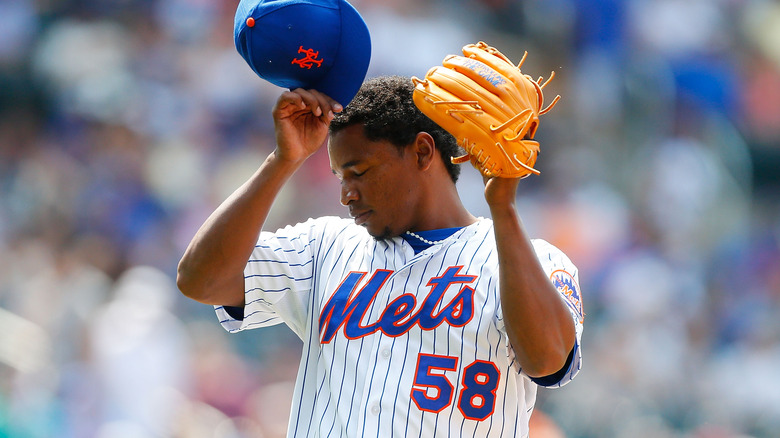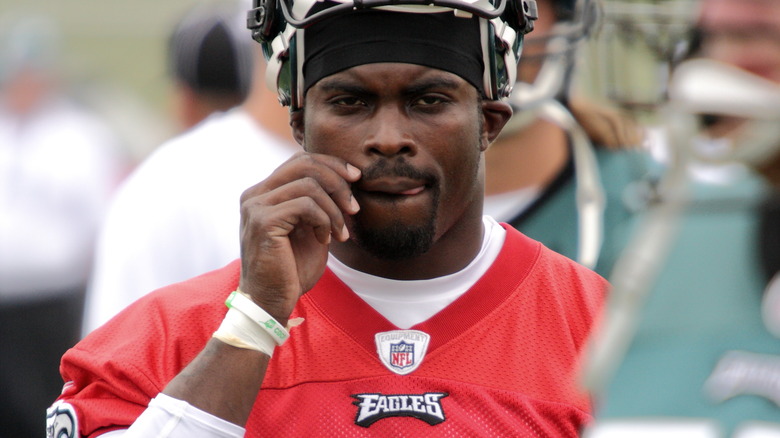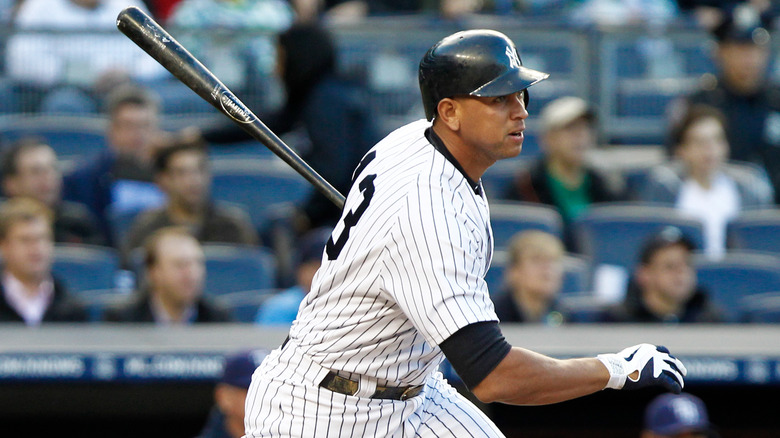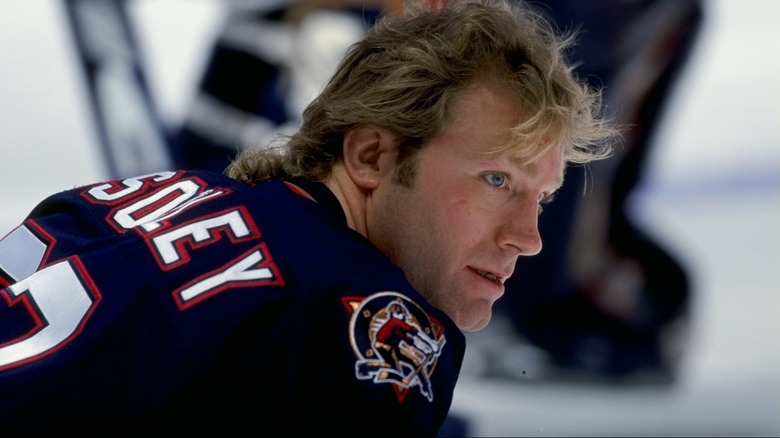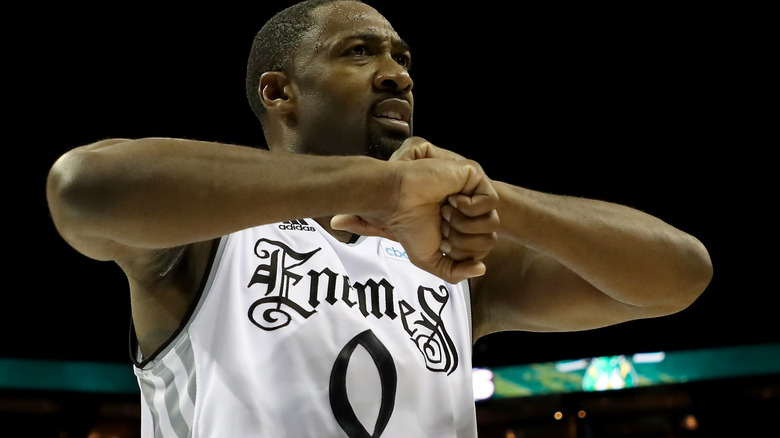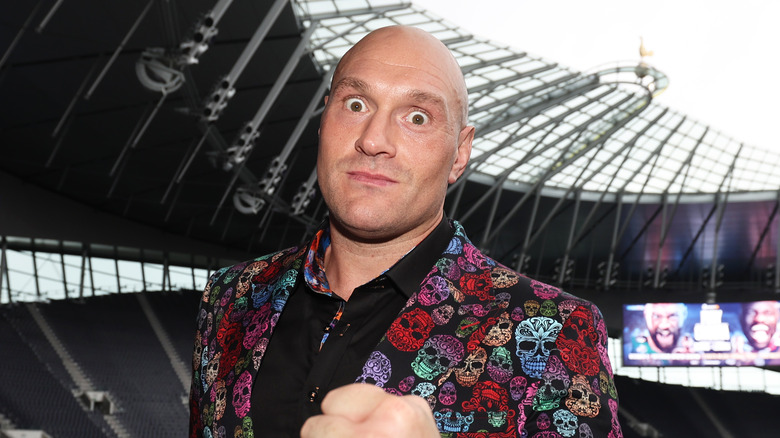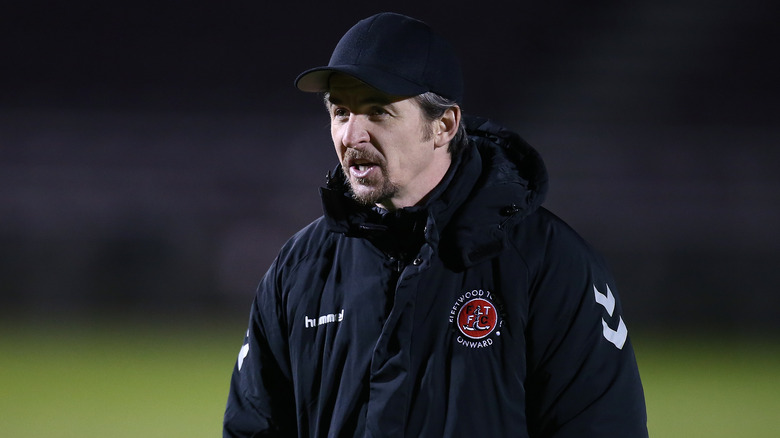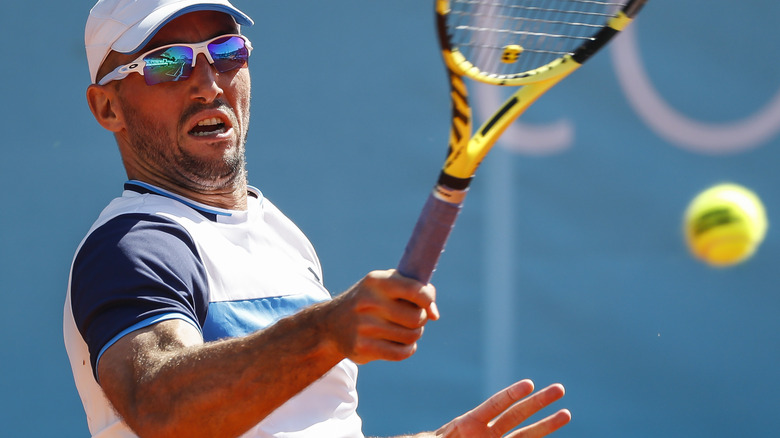The Longest Suspensions In Sports History
It's no secret that competing at the level of a professional athlete is tough. Not only is there the need to perform consistently and at the top of their game, there's also the sneaky knowledge that a career in sports just isn't going to have the same kind of length as a career in, say, auto repair. Depending on the sport, an athlete might be looking at retirement in a decade or so ... and that might persuade someone to see just how far they can bend the rules in the hopes of getting the most out of their short career.
Sometimes, that career ends up getting shortened in another way: by suspension. While minor offenses might result in being told to watch one or two games from the bench, others are much, much more serious. Players who get suspended for things like doping, gambling, and betting on — or against — their own team, or fighting might be looking at going entire seasons without being allowed to play.
One of the most infamous cases of an athlete being told that they were done was Lance Armstrong: He was handed a lifetime ban in 2012 (via USADA) for doping. But let's talk about suspensions. Sure, they might be able to look forward to returning, but in some cases, athletes have been handed suspensions so long that it took a huge chunk out of their career as a competitor.
Muhammad Ali
Originally, says Sports Illustrated, Muhammad Ali was ruled ineligible to be drafted into the military — not because of his boxing career, but because he had dyslexia. As the conflict dragged on, more and more people found their exemptions disappearing, including Ali.
On April 28, 1967, Ali answered a summons to Houston's Armed Forces Induction Center, and when they called his name — Cassius Clay — three times, he simply refused to step forward. He later explained (via The Washington Post), "My conscience won't let me go shoot my brother, or some darker people, or some poor hungry people in the mud for big, powerful America. And shoot them for what?? ... Just take me to jail." Ali was convicted on June 20 of the same year, handed a $10,000 fine, a five-year prison sentence, and was suspended from boxing. He had known exactly what it would do to his career, too, later writing, "When I fly out of Houston, I'm flying into an exile that will eat up what boxing experts regard as 'the best years of a fighter's life.'"
His suspension would last for around three years, until he finally returned to the ring on October 26, 1970 (against Jerry Quarry). His decision was lauded by Martin Luther King, Jr., and in the end, it all turned out to be for nothing: In 1971, his conviction was overturned by the Supreme Court.
Mariano Puerta
In 2005, professional tennis player Mariano Puerta found himself in hot water once again. According to The Guardian, results from drug tests had apparently been leaked to a French paper called L'Equipe, and before Puerta even got a phone call, outlets were reporting that he had tested positive for a stimulant called etilefrine. This came two years after he was handed a nine-month suspension for testing positive for another banned substance (clenbuterol).
The Argentinian pro was quick to deny the charges, saying, "After the previous positive, I've got to be very careful, I can't even take an orange juice. I can't drink anything. It's too dangerous." Just a few months later, he was handed a whopping eight-year suspension (via The Guardian). Along with that, he was forced to forfeit his ranking points and the prize money he'd won — that alone equaled a loss of around half a million USD ... give or take.
And, the story wasn't over just yet. Puerta appealed, saying that he had accidentally ingested the substance after sharing a glass of water with his then-wife, who was taking a medication containing the substance to manage menstrual pain. It wasn't until 2020 that he admitted in an interview that the story was a complete lie (via ESPN), that the drug must have come from some pills prepared by the proverbial friend-of-a-friend, and it succeeded in getting his suspension reduced to just two years. He retired shortly after being reinstated.
Trevor Bauer
In early 2021, Trevor Bauer signed a three-year, $102 million contract with the Dodgers. Needless to say, that's a huge deal — and in April of 2022, ESPN announced that he had been handed a 324-game suspension amid accusations of sexual assault.
The accusations were detailed in a piece The Washington Post ran around the time news of his suspension went public, and according to their investigation, Bauer had been accused of assault by three different women. They claimed that there were a series of incidents that had taken place over the course of several years. (The women, as victims in a domestic violence case, are not identified.) Bauer's suspension was unpaid, and it wasn't the first time sanctions had been handed to him: He was already on paid leave amid accusations filed by a California woman, who had attempted to get a restraining order against him after claiming he had injured her so badly that she had been sent to the hospital. (A court upheld his defense that everything that had happened was consensual.)
Bauer has wholeheartedly contested all the accusations, saying, "In the strongest possible terms, I deny committing any violation of the league's domestic violence and sexual assault policy. I am appealing this action and expect to prevail."
If you or anyone you know has been a victim of sexual assault, help is available. Visit the Rape, Abuse & Incest National Network website or contact RAINN's National Helpline at 1-800-656-HOPE (4673).
Diego Maradona
Diego Maradona was an absolute legend. How much of a legend? Let's just say that the jersey he wore when he scored a particularly infamous goal in the 1986 World Cup sold for $9 million in 2022 (via NPR), and when he passed away in 2020 after a prolonged illness, the Argentinian courts ruled that those in charge of his care could be brought up on homicide charges for their negligence.
At the time of his death, the 60-year-old football star was undergoing treatment for alcohol addiction, and it was banned substances that got him handed several suspensions. In 1991, the Los Angeles Times reported that he had been given a 15-month suspension after testing positive for cocaine use.
Then, in 1994, Maradona was suspended again, and according to The Washington Post, this time it was indefinite. His offense this time was testing positive for five different stimulants, all on the list of banned substances, and all ingredients in prescription cold and allergy medications. Maradona denied wrongdoing, saying (via The New York Times), "They have retired me from soccer. I don't think I want another revenge, my soul is broken." To his credit, Maradona owned it: In 1996, The Irish Times reported that he had lent his name, image, and experiences to a government-funded anti-drug campaign, writing, "I was, am, and always will be a drug addict. ... You have to say, 'Today I am going to turn round and fight the drugs hell. It's the only way to escape.'"
If you or anyone you know needs help with addiction issues, help is available. Visit the Substance Abuse and Mental Health Services Administration website or contact SAMHSA's National Helpline at 1-800-662-HELP (4357).
Jenrry Mejia, Marlon Byrd, Robinson Cano, and Francis Martes
Four players share a dubious honor: Getting some of the longest suspensions ever handed out by Major League Baseball. Francis Martes was suspended in 2020, reported CBS, after a drug test came back positive for a substance called Boldenone. The penalty was stiff: 162 games (or in other words, one season) without pay. The suspension meant that he'd spent years not pitching for the Houston Astros, as immediately prior to that, he'd had surgery, and before that? A 2019 suspension for 80 games, also due to a failed drug test.
Similarly, Robinson Cano over at the Mets was suspended for 80 games on his first failed drug test (in 2018), and on the heels of that, was handed another 162-game suspension for his second offense in 2020. As of 2022, The New York Times reported that he was hoping to make a comeback. Marlon Byrd's first offense resulted in a 50-game suspension in 2012, and according to The New York Times, it was in 2016 when he failed a drug test for the growth hormone Ipamorelin. He declined to appeal the decision after his counsel said they had traced it to a contaminated supplement.
And Jenrry Mejia (pictured)? ESPN says he was given an 80-game suspension for his first failed drug test, and a 162-game suspension after failing his second three weeks after returning to play. Then, in February 2016, he was given a permanent suspension for a third failed test. Although he was reinstated in 2018, the Mets released him from his contract (via CBS).
Michael Vick
Michael Vick's arrest and conviction after the discovery of his Bad Newz Kennels, and the dog-fighting ring run out of them, was one of the most infamous incidents in sports' history — and it initially resulted in an infinite suspension from the NFL. According to CNN, the league responded to his plea deal by issuing the suspension to not only censure Vick, but to make "a strong statement that conduct which tarnishes the good reputation of the NFL will not be tolerated" — per Atlanta Falcons owner Arthur Blank.
That was in August of 2007, and the suspension would ultimately last just under two years. ESPN reported that when Vick was released from his 18-month prison service, the suspension was lifted completely. Vick was free to find another team — although many said they would refuse to hire him — and take the field again as a fully-paid member of the NFL.
He was signed by the Philadelphia Eagles, and according to the Associated Press (via NOLA), his first appearance on the field was met with a standing ovation from the crowd. After running just a few plays then leaving the field, the stadium — which was half-empty — began calling for his return.
Alex Rodriguez
In 2013, Major League Baseball cracked down on doping in a massive way. According to CNBC, that was the year that saw 13 players suspended for what the league reported as "use and possession of numerous forms of prohibited performance-enhancing substances, including testosterone and human growth hormone over the course of multiple years."
The scandal came in the wake of the release of boxes and boxes of information by a former employee turned whistleblower named Porter Fischer. The information Fischer handed over to the Miami New Times connected the dots between a slew of baseball players and a clinic called Biogenesis, which was in turn linked to the use (and cover-up) of performance-enhancing drugs (via The Guardian).
While most of the players implicated in the scandal were given 50-game suspensions, Alex Rodriquez was handed a whopping 211-game suspension. Why? The MLB accused him of not only taking the drugs, but interfering with the investigation. Rodriguez went on to appeal the decision (and became the only player to do so), which USA Today says resulted in the lowering of his suspension to 162 games — an entire season. The following year, the MLB issued their official overhaul of their anti-doping policy to include specifics: Since players are paid per day instead of per game, Rodriguez was still paid for some of the days of his suspension (via NBC).
Marty McSorley
Watching any hockey game, whether it's pro or not, comes with the expectation of a little violence, but in 2000, the Bruins' Marty McSorley went more than a little too far. According to The Washington Post, McSorley's from-behind swing toward Donald Brashear connected with the side of his head, knocked his helmet off, caused a concussion quickly followed by a massive seizure, and sent the Vancouver player to the hospital.
McSorley wasn't just suspended, he was also put on trial in British Columbia for the assault. According to Sports Illustrated, he wasn't given a sentence in spite of being found guilty, and was instead released on what was called a "conditional discharge." In a nutshell: Stay away from Brashear.
McSorley immediately went to the NHL and told them that he wanted to play again, but the response wasn't quite the one he was looking for. Instead of being put back on the ice, he was handed the longest suspension the NHL had ever issued for on-ice conduct: One calendar year. In other words, that was at least 82 games, along with any preseason, training, and post-season events and games. Brashear recovered, with no memory of the event.
Javaris Crittenton and Gilbert Arenas
Professional athletes are, by nature, competitive, and in 2009, a bizarre saga unfolded that would lead to the season-long suspension of Wizards' players Javaris Crittenton and Gilbert Arenas (pictured). Arenas recounted the whole saga to Action, saying that it started when he joined in on a card game that was already in progress. Crittenton was losing badly, lost some more, and more words were exchanged until Crittenton threatened to shoot Arenas. Arenas said that he'd supply the guns ... and that's precisely what he did.
"It was about me calling his bluff. You say you're going to shoot me? Fine, I'll bring you the guns to do it," Arenas explained. Those guns were four (unloaded) weapons — including a Desert Eagle — that Arenas took into the team's locker room. The joke quickly turned not-so-funny, when Crittenton pulled a very loaded gun out, pointed it at Arenas, and remarked that he had his own.
According to The New York Times, NBA Commissioner David Stern suspended Arenas indefinitely after seeing him making and shooting finger guns on the court — issuing his ruling long before any investigation was wrapped up. Crittenton was also suspended for the season, and was found guilty of a misdemeanor weapons charge: In 2015, he would plead guilty to unrelated manslaughter charges and be handed a 23-year prison sentence (via ESPN).
Tyson and Hughie Fury
In something like baseball, hockey, or football, news of suspensions hit the media pretty quickly. Boxing can be a little different: When Tyson Fury was handed a two-year suspension for doping, INews says it took months for the ruling to go public.
How did that happen? Fury had a 2016 rematch scheduled with Wladimir Klitschko, and a month prior to the match, he was suspended. It didn't really matter, though, as he had already backed out of the fight citing an injury. According to The Guardian, news of the results broke when both Tyson and Hughie Fury (who had also tested positive for a banned steroid called nandrolone) said they were planning on suing UK Anti-Doping (Ukad). Ukad responded by issuing a formal statement: "In response to public comments made by Tyson and Hughie Fury's representative, UK Anti-Doping can confirm that both boxers were charged on 24 June 2016 with the presence [in urine tests] of a prohibited substance."
The Fury camps' threat to sue was very real, and what unfolded was an investigation and legal fight that cost somewhere around half a million pounds. The Fury cousins claimed they had ingested the substance when they ate wild boar, and in December 2017, everyone came to something of an odd agreement. Both Tyson and Hughie Fury were suspended from boxing for two years, but given that the suspension was backdated two years, that meant they were free to step back in the ring immediately.
Joey Barton
While drug offenses might be the most well-known and common reason for players to be handed a suspension, that's not what happened with UK footballer Joey Barton at all. According to The Irish Times, he was suspended for 18 months after the Football Association accused him of off-the-field misconduct. The offenses he was charged with were said to have taken place between 2006 and 2013, when he reportedly bet on 1,260 different matches — including ones that he was playing in.
Barton made an official statement that said while he admitted to placing a few bets against his own team — and he clarified that yes, he understood why that was a problem — that the bets he placed on football matches were just a small portion of the 15,000+ bets he'd made over that period. The Guardian took a look at some of the most problematic bets that he placed, and found that the majority of them were for no more than between £2 and £25, with some as high as £600. (The majority were lost.)
The BBC later reported that Barton's appeal had been partially successful, as it was ruled that evidence initially presented should not have been discounted, but was. That was a testimony from mental health professionals who spoke of Barton's addiction to gambling, and five months was taken off the suspension on review.
Viktor Troicki
In 2013, Serbian tennis player Viktor Troicki was handed an 18-month suspension for what he said was a simple mistake.
According to The Guardian, the incident in question happened ahead of the Monte Carlo Masters. Troicki was feeling under the weather when he went to give fluid samples for the standard drug testing, and gave only a urine sample, without giving the required blood sample. Troicki later said that the representative collecting the samples said the single sample was fine, but the investigation into the matter came to the conclusion that she had never actually told him that the International Tennis Federation would accept his reasoning of being sick at the time.
The BBC later reported that upon review, the suspension was shortened to a year. The Court of Arbitration for Sport ruled that there was no evidence that he had refused to give a sample maliciously or with an intent to hide anything, and there was no evidence that he had ever taken a banned substance. Troicki was devastated: "This decision put an end to my dreams of being a top player."
